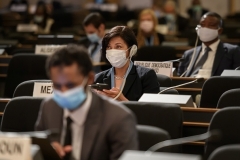
Masked delegates at a U.N. Human Rights Council session in Geneva. (Photo by Fabrice Coffrini/Pool/AFP via Getty Images)
(CNSNews.com) – The United Nations has confirmed the names of most of the candidates running for seats on the U.N. Human Rights Council in elections tentatively set for next week, and the expected return of the likes of China, Russia, Saudi Arabia, and Cuba will draw attention once again to the justification given by the Trump administration in 2018 for its decision to withdraw.
Unless rescheduled as a result of the coronavirus pandemic, the U.N. General Assembly in New York will next Tuesday hold a secret ballot election to fill 15 of the 47 seats on the Geneva-based HRC for new three-year terms.
Seats on the council are divvied up between the five regional groups recognized by the U.N., so of the 15 vacancies, four seats are for countries in Africa, four for Asia, three for Latin America and the Caribbean, and two each for Eastern Europe and the Western Europe and other states group (WEOG).
In the current HRC, a full one-quarter of the membership – 12 of the 47 members – are countries with poor human rights records: Afghanistan, Angola, Bahrain, Cameroon, Democratic Republic of the Congo, Eritrea, Libya, Mauritania, Qatar, Somalia, Sudan, and the Maduro regime in Venezuela.
Four of them – Angola, Afghanistan, Qatar and the DRC – are ending their terms on the council, but with others poised to take up seats, the balance may tip even further towards repressive countries.
Depending on which country makes an 11th hour bid for a remaining opening in the Africa group, and on the outcome of the vote in one competitive slate (for Asia), the HRC in 2021 will have anywhere from 12 to 14 members that are countries ranked “not free” by the Washington-based democracy watchdog Freedom House, because of poor records on political freedoms and civil liberties.
That means that between 25 and 29 percent of the seats on the U.N.’s top human rights body will be held by autocracies frequently accused of violating human rights.
If 14 members of the council in 2021 (29 percent) fall into that category, that will equal the worst composition ever in the HRC’s 14-year history (tying with 2018 and 2019).
Even in the best-case scenario of the number of “not free” countries on the HRC being limited to 12 in 2021, the overall situation will still be significantly worse than this year, because of the return of China and Russia (influential Security Council permanent members), Cuba (a particularly activist HRC member in previous years), and Saudi Arabia and Uzbekistan (whose human rights records place them in the bottom 3.5 percent and 5.5 percent of Freedom House rankings respectively.)
Over its 14-year existence, the HRC has never had more than 25 “free” countries (53 percent) among its members, in 2006. The smallest caucus of “free” countries was just 18-strong (38 percent), in 2016.
(Graph: CNSNews.com/Data: OHCHR, Freedom House)
As things stand, the council in 2021 looks likely to have 19 “free” members (40.4 percent).
When the Trump administration withdrew from the HRC in mid-2018, then-ambassador to the U.N. Nikki Haley – who had earlier led an unsuccessful effort to reform the council – cited the poor quality of its membership, along with a disproportionate focus on Israel, as reasons for doing so.
“Human rights abusers continue to serve on and be elected to the council,” she said. “The world’s most inhumane regimes continue to escape scrutiny. And the council continues politicizing and scapegoating of countries with positive human rights records – in an attempt to distract from the abusers in their ranks.”
The Democratic Party’s 2020 platform includes a pledge to “rejoin and reform” the HRC.
The regional group breakdown in the upcoming elections is as follows:
ASIA: The Asia group is the only one of the five currently offering a competitive slate – five candidates for four vacant seats. The candidates are China, Nepal, Pakistan, Saudi Arabia, and Uzbekistan. Nepal and Pakistan are graded “partly free” by Freedom House. The vote will therefore result in either two “not free” and two “partly free” members joining the Asia group, or three “not free” and one “partly free.”
AFRICA: As of early Monday only three candidates have declared for four vacant seats. The three – all “partly free” – are Cote d’Ivoire, Malawi, and Senegal. Current “not free” African nations whose membership will continue next year include Libya, Eritrea, Sudan, Somalia, Mauritania, and Cameroon.
LATIN AMERICA: This group has a “closed slate” – three candidates for three vacancies. They are Cuba (“not free”), Bolivia (“partly free”) and Mexico (“partly free”).
EASTERN EUROPE: Another “closed slate,” with Russia and Ukraine candidates for two vacant seats.
WEOG: Also a “closed slate,” with Britain and France candidates for two vacant seats.
